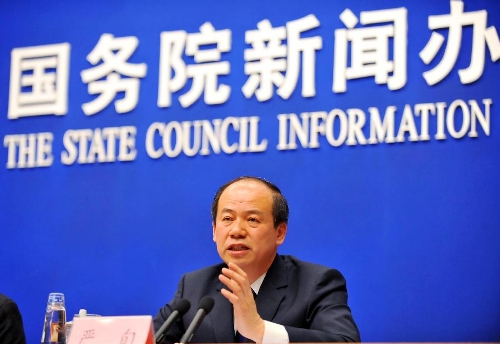Experts slam wildlife allegations

Yan Xun, chief engineer of the Department of the Wildlife Conservation and Nature Reserve Management under the State Forestry Administration, answers questions during a press conference on the wildlife conservation in China held by the State Council Information Office in Beijing, capital of China, May 21, 2013. (Xinhua/Chen Yehua)
China's top wildlife preservation authority on Tuesday slammed accusations that China's ivory business has facilitated elephant poaching on a global scale and called for international collaboration to curb ivory smuggling.
Yan Xun, chief engineer of the wildlife preservation department in the State Forestry Administration (SFA), said in Beijing that China's legal ivory industry and elephant poaching are not necessarily connected.
"There are complicated reasons behind elephant poaching, for example, the conflict between people and animals fighting for habitat, the problem of basic survival and livelihood of certain tribes and their people, the need to finance regional wars, illegal trading groups, and the lure for profit in ivory smuggling," said Yan, adding that curbing smuggling requires collaboration of multiple countries.
China has long been criticized by Western media for its incompetence in stopping ivory smuggling and driving the illegal ivory trade through soaring demand.
"We have enacted a series of strict regulations to supervise the production and sales of ivory products. Suspects could be sentenced to life in prison," said Yan.
China has ruled that every ivory carving company must acquire source material through legal auctions under the supervision of the Convention on International Trade in Endangered Species of Wild Fauna and Flora, and must report to the SFA on an annual basis for the amount of ivory it intends to consume.
To obtain a license, a carving company must employ at least one government-approved carving master. Authorities also rule that every piece of ivory work weighing more than 50 grams must be documented with photos and a certificate.
There are currently 37 licensed carving companies and 145 sales companies. The total consumption of ivory in the country amounts to less than five tons per year, said Yan.
Yin Hong, a deputy director of the SFA, also denied that China is the world's largest country for the consumption of wild animals and illicit wildlife trading, calling such accusations "unprofessional" and "misleading." "There is no accurate and substantial data to support this idea."
"In terms of hunting, trade of alligator products or pets, the country is nowhere near the top," said Yin, adding that recent law enforcement data showed efforts are being made.
In January, China initiated for the first time an international operation with 22 countries to crack down on cross-border and intercontinental wildlife smuggling. A large number of wild animals and related products were seized in over 200 smuggling cases, including 6.5 tons of ivory, 1.55 tons of cashmere from Tibetan antelopes, 800 kilograms of pangolin scales and 324 helmet hornbill beaks. More than 100 suspects were also arrested.